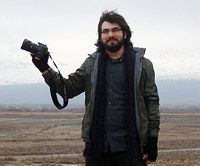Ibrahim Unal studies photography at Istanbul’s College of Culture. I met him for the first time in Istanbul, when a group of journalists from Armenia had been invited to a gathering by our Turkish colleagues. Istanbul Armenians were also present. Ibrahim Unal introduced himself as a “heal-Armenian”, noting his Armenian roots. He spoke about his film “In the Shadow of Ararat” that he shot while in Armenia. I got a chance to watch the film a few days ago. It stands out with its attention to detail. Mount Ararat itself is the main character in this drama.
– What was the underlying reason for making this film?
– One of my instructors told me about an Armenian-Turkish media-dialog project and that if I wanted I could join in. The project organizers then selected six Armenian and six Turkish students. The Armenians were to shot a documentary film in Turkey and the Turkish students the same in Armenia. Years ago I had read Ece Temelkuran’s book Deep Mountain: Across the Turkish-Armenian Divide. I was quite moved and understood that Ararat is the heart of the Armenian people. Since there was the opportunity to make a film, the project exists, I decided to portray this theme via film. I traveled to Armenia three times in a year to shoot it.
– So what is Ararat for you?
– Ararat is the pain of the Armenians. It’s a magnificent mountain and, at the same time, a form and impressions. I know that for the Turks Ararat is merely a lofty summit. But for all Armenians, as well as myself, Ararat is deepness, intensity. That’s what I tried to portray in my film.
– At the end of the film you show Tzitzernakaberd (the Genocide Memorial). This is followed by a scene of Ararat from the Turkish side, as if to say the eviction of Armenians from there. What was the message you wanted to convey in this sequence?
– I particularly want to tell the Turkish people that this pain is about the Genocide. The pomegranate, Ararat and the Genocide Museum are all symbolic and each has a certain meaning as well as that they are remembered.
– Where do your roots lie?
– My father’s great- grandmother is from Van. I suspect she was an Armenian.
– Did you ever ask your parents?
– My family always concealed this reality.
– Why?
– They would merely say the woman was a family elder and nothing more. Maybe they are afraid of the truth. Maybe there are other reasons.
– By the way, the French Senate recently passed a bill criminalizing the denial of the Genocide. To put it mildly, the Turkish government opposed the move. What impact do you think it will have on Turkish public sentiment?
– Certain fanatical groups in Turkey said that the voting was suspect since Sarkozy pushed the bill in light of the upcoming presidential election. This isn’t a sincere view. Of course, the Senate vote was very important for Armenians but it also opposes freedom of speech. In my opinion, freedom would have been served if it was declared in France that ‘it wasn’t a Genocide’, and the opposite in Turkey, that ‘yes it was a Genocide.’
– So what impact will these attitudes have on the life of Armenians living in Turkey?
– My Armenian friends were also opposed to the Senate vote. There are certain Armenians who fear fascism. The Turkish and Armenian peoples know the truth about what happened. In the end, only we can put a name to the pain and suffering, and not some outside governments.
– We’ve been talking about the normalization of Armenian-Turkish relations for quite a while. What do you think? Is it possible to hold real dialog when one of the parties bears an open wound that won’t go away?
– A great tragedy took place in 1915. Everyone knows this. In this case, both Armenian and Turkish intellectuals can change these expressions. I realize it won’t happen today but one day, for sure, all will change. We have no desire to bear the heavy burden of the past. Certain things must change. We are hopeful they will.
– Nevertheless, just how free are the Turkish youth in their country?
– Turkish young people are not fully free. It depends on what city or region they live in. Here in Istanbul, we can feel free but we can’t say the same for Anatolia, in particular. As an example, let me cite my film for the Armenians. I shot scenes at the Genocide Museum in Yerevan and used them. No problems ensued as a result.
– How will the situation change if Turkish governments continue to conceal the true history and if it’s still prohibited to sell books on the Genocide in Istanbul stores? Don’t you think that until Turkey recognizes the Genocide its relations, not only with Armenians but the rest of the world, will become more problematic?
– Yes, they hide the truth, but I and others are hopeful that things will slowly change because it is the young people that can change those perceptions about Armenian-Turkish relations. We are not enemies. We must never forget that we are all human beings. Things are taking a turn for the worse in the world, but if you want things to change they will. The new generation will see to it.

